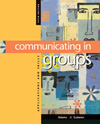Terrorism, TV, and Groupthink On September 11, 2001, people from around the world watched images of violence
on their televisions. In the wake of terrorist attacks on the World Trade Center
and the Pentagon, TV news organizations such as CNN and MSNBC transitioned to
24-hour, nonstop coverage of the attacks and eventual war against terrorism. Consider your own experiences watching TV reports of the terrorist actions,
anthrax scares, and subsequent war on terrorism. You may also want to refresh
your memory by exploring archived reports on CNN.com
or MSNBC.com. To what extent do you think mediated
reports of these events made the public susceptible to groupthink? In emergency
situations like these, what are some potential negative consequences of mass
groupthink? In small groups, members can reduce the effects of groupthink by "kicking
the problem around," establishing norms of critical evaluation, preventing
insulation of the group. In larger groups of people, like the mass audiences
watching TV reports of terrorism, how could these same principles be applied?
Are there ways that our culture, like small groups, can reduce the effects of
groupthink on the way we assign meaning to mediated messages? |



 2003 McGraw-Hill Higher Education
2003 McGraw-Hill Higher Education